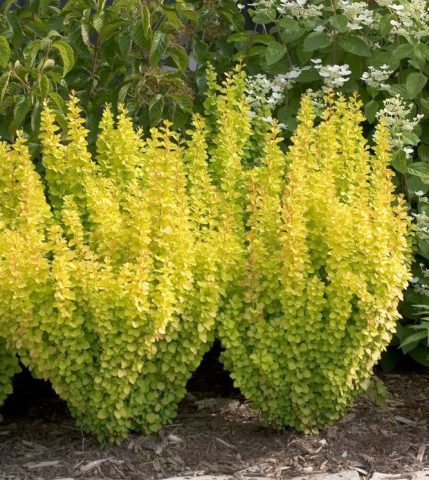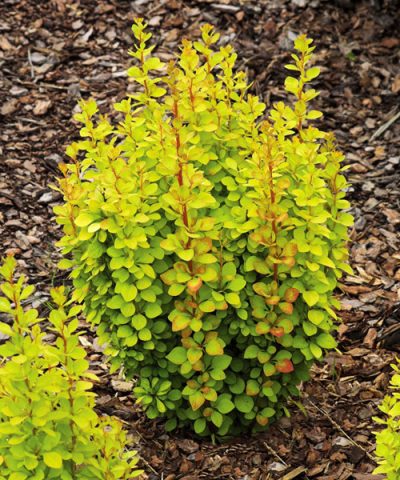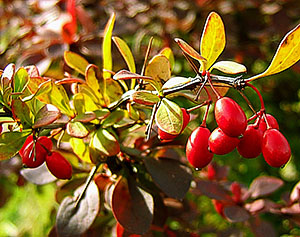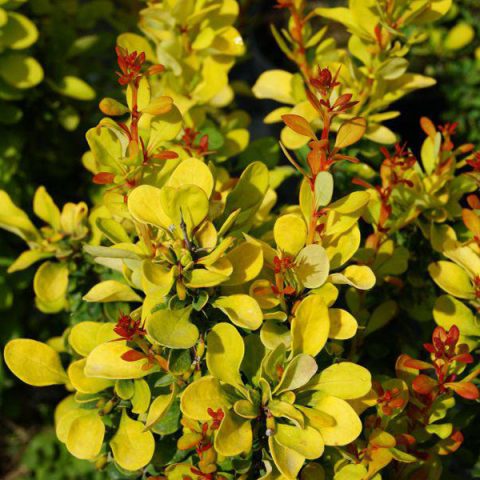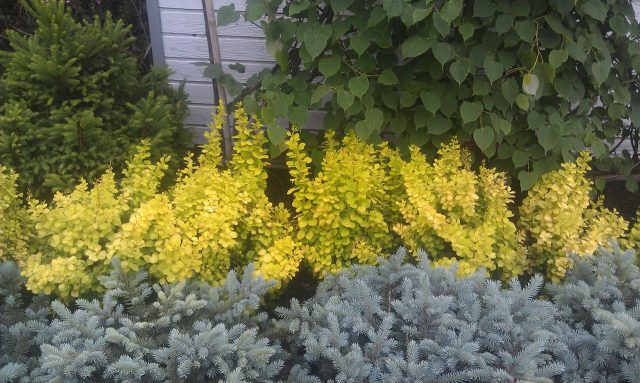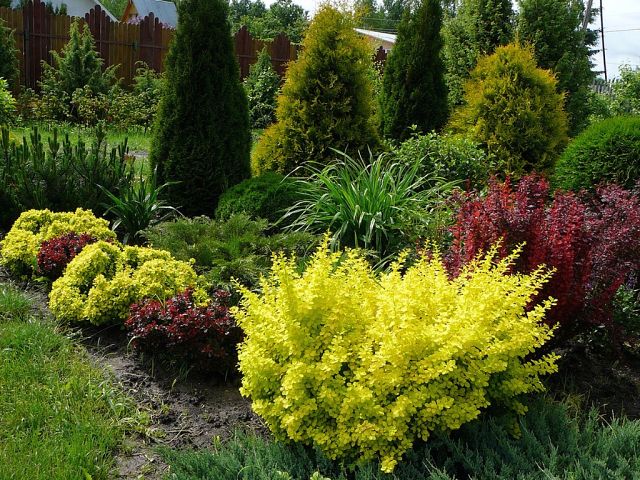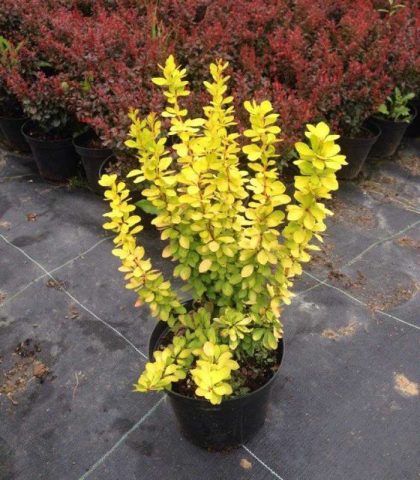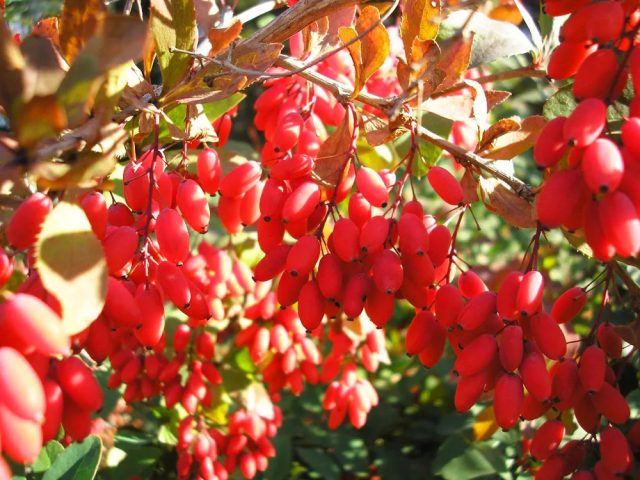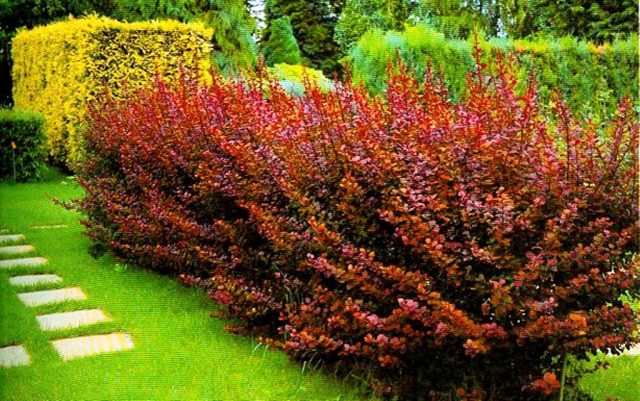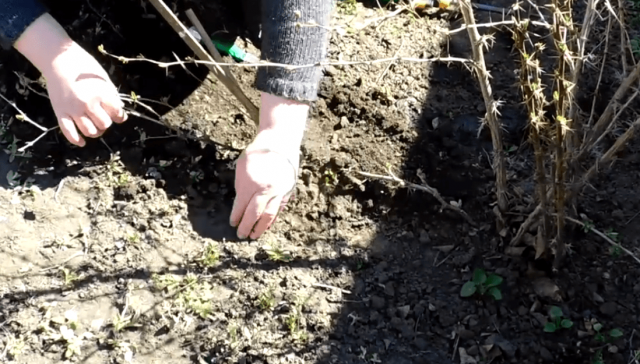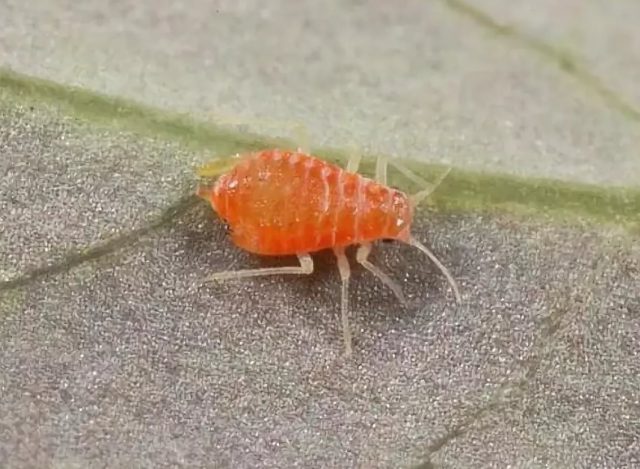Content
Many people perceive barberry as a fragrant berry, sweet and tasty candy. But it is not only the fruits that attract the attention of gardeners. Landscape designers use Golden Rocket barberry to decorate their summer cottage. Throughout the growing season, the plant attracts with its decorative effect. And how not to admire the unusual flowers and leaves!
Description of barberry Golden Rocket
Barberry Thunberg Golden Rocket belongs to the columnar deciduous shrubs. Shoots are vertical, tough, grow up to 1.5 m, the span of a dense crown is almost half a meter. The bush grows slowly, the annual growth is small.
The shoots of the first year have a deep orange-pink color. Older stems are reddish. On the shoots along the entire length, there are sharp thorns of about 1 cm.
The small-sized leaves of the Golden Rocket barberry (as in the photo below) attract attention with their uniqueness. The leaves are round in shape.
The formation of buds, and then flowering, begins in June. Delicate flowers with a pale yellow tint. Golden Rocket barberry flowers are fragrant, so there are many bees above them during flowering. Gardeners often set up hives next to plantings.
The berries ripen by the end of September, do not fall off after full ripening. The productivity of the bushes is stable from year to year. The fruits give a special decorative effect to the Golden Rocket barberry bushes with their coral color. By the end of November, the leaves fall off, only berries remain on the bushes, which birds feed on in winter.
Barberry Golden Rocket in landscape design
The decorativeness of Golden Rocket barberry attracts landscape designers and gardeners. With the help of a shrub with a dense and wide crown, you can:
- frame lawns, create hedges;
- create rockeries, and rocky gardens in the Japanese style;
- plant barberry one by one or include it in group compositions;
- arrange flower beds;
- use as a specimen for mini-coniferous gardens;
- arrange mixborders.
Hedge
When creating hedges, the possibility of crown modeling by trimming is taken into account. Branches of Golden Rocket barberry grow densely, bloom beautifully. In autumn, decorativeness is provided by bright yellow leaves with a reddish tint and coral berries. At this time, birds flock to the bushes, filling the entire neighborhood with their chirping.
Plants with a spreading crown can be planted on low elevations. Typically, gardeners who want to create a unique hedge use barberry varieties with different leaf colors. In China and Japan, landscape designers create real masterpieces, giving the bushes different heights and shapes.
Against the background of conifers
Evergreen conifers are a great backdrop for the Thunberg Golden Rocket. Emerald greens effectively set off the yellow leaves of the barberry. The plant also looks unique in autumn, when rich red berries ripen on it.
Single landings
Most often, summer cottages are small; it will not work to place a hedge on them. Therefore, landscape designers prefer single plantings of Golden Rocket barberry.
If the site has a pool or other artificial reservoir, you can plant barberry bushes around them. The uniqueness of this plant placement is that the site will resemble a forest clearing by a lake or river.
Low plants with decorative colors of leaves and fruits are ideal for alpine slides and stone gardens. You just need to find the ideal height and trim the bushes correctly.
Rockery and microborder
Experienced gardeners, familiar with the secrets of landscape design, create beautiful rockeries with the help of Golden Rocket barberry. After all, the shrub goes well with other types of flowering plants.
Light fences made of wood or brick, you can decorate with barberry. Expanding in width, the bushes will hide any flaws in the fence, take up free space.
Planting and caring for Golden Rocket barberry
Barberry Thunberg Golden Rocket is an unpretentious plant. It can be planted on any soil other than acidic. With an increased rate, lime or wood ash is added before planting. It is not recommended to grow barberry bushes in places where water stagnates.
For single plantings, the distance between the bushes is maintained - 1.5-2 m.To create a hedge, barberry is placed in increments of 0.5 m.
Seedling and planting plot preparation
For planting Golden Rocket barberry, a well-lit area is chosen. Do not plant bushes in the shade of tall trees. When placed against the background of conifers, they retreat from trees and shrubs at a distance of at least 1.5 m so that a shadow does not fall on the barberry, and the root system of trees does not interfere with its development. The site is dug up, weeds and their roots are removed. If necessary, add wood ash or lime.
Planting material should not be damaged by diseases and pests. If the plant has an open root system, then this part should be at least 20 cm long, healthy and alive.
It is advisable to plant seedlings after purchase. If there is not enough time, the seedlings are buried in the shade or the roots are wrapped in plastic so that they do not dry out. Before planting for a day, the barberry is soaked in plain water or a pale pink solution of potassium permanganate.
Planting plants with an open root system should be planned for the fall, when the leaves fall off the seedlings, or in the spring, until the buds swell. Container-grown Golden Rocket barberry plants can be planted at any time.
Landing rules
When preparing a pit for barberry, you need to take into account the size of the root system. The seat should be twice as large.
Planting stages:
- Drainage is laid at the bottom of the planting pit, then soil consisting of sand and humus in equal proportions.
- A hill is made in the center of the hole, a seedling is placed on it and the root system is straightened, if it is open.
- If barberry is planted from a container, then the roots of the plant are strongly twisted. To speed up survival, you need to cut the lump vertically in several places.
- Sprinkle plants to the root collar, like other deciduous shrubs. This planting stimulates the growth of young shoots.
- The soil is tamped and watered abundantly to remove air bubbles from under the roots.
- The aerial part is cut off, leaving several buds. You should not regret the regrown shoots, the fact is that such a procedure accelerates rooting. Barberry Golden Rocket will not have to spend energy on the maintenance of the aboveground part.
- After planting, the soil is mulched, the plants are watered every week.
Watering and feeding
In the first years of life, barberry needs watering with warm water. In the future, the plant provides itself with moisture on its own, thanks to its powerful root system. Therefore, plantings are watered only during a prolonged drought.
The bushes are fed with organic matter in the spring.
Pruning
Since the plant is grown to decorate the site, it is necessary to carry out 2 types of pruning:
- decorative;
- sanitary.
Sanitary haircuts are carried out in spring and autumn. At the same time, damaged and underdeveloped shoots are removed. Branches growing inside the bush are also cut out.
The hedge is trimmed in the 2nd year after planting, cutting off the shoots by 2/3 of the height. Then pruning is carried out twice a year: in June and August.
Preparing for winter
In the fall, before the onset of frost, the soil around the bushes is covered with mulch: compost, peat, sawdust or fine bark.
Adult barberry bushes Thunberg Golden Rocket, according to the description, are winter-hardy, so they do not need shelter. Young plants are covered with spruce branches or dry foliage for 2-3 years.
Reproduction
Buying seedlings is quite expensive, especially for creating a hedge. If there are already barberry plantings on the site, then the planting material can be obtained on your own.
Thunberg breeds:
- cuttings;
- dividing the bush;
- layering;
- seeds.
And now about each method in more detail.
Cuttings
In the spring, until the leaves have blossomed, you need to cut cuttings from well-developed young shoots. Stick into the ground, in a greenhouse, cover with polyethylene. In order for the cuttings to give roots faster, any growth accelerators are used for watering. When the leaves appear, you need to remove the film. Water sparingly and be sure to loosen the soil. It is better to transplant to a permanent place in the fall.
Dividing the bush
Carefully remove the bush from the hole and cut it into pieces so that each of them has growth buds and a root system. Immediately put in a permanent place.
Layers
In the spring, select annual shoots and bend them to the ground in a pre-made groove and fix well with a bracket. Cover with earth to a depth of 20 cm. In the future, the future seedling is watered. In the fall, it will have a well-developed root system.
Seeds
It is not difficult to collect barberry seeds on your own; it is enough to take ripe fruits. Select seeds and dry. Before sowing, the seeds are washed in a pink solution of potassium permanganate.
Barberry is sown before winter, since the seed requires natural stratification. Seedlings appear the next year. After 12-18 months, the seedlings are moved to a permanent place. Fruiting of barberry grown from seeds will begin in 2-3 years.
Diseases and pests
Like any cultivated plants, the Thunberg barberry is affected by diseases and pests.
The shrub is often sick with fungal diseases. The problem can be identified by early wilting and drying of the foliage. To fight, you need to use chemicals.
Of the pests, gardeners note the barberry aphid. Yellow-red insects settle on the lower part of the leaf, suck out the juice. The foliage begins to dry and fall off. As a result, flower buds do not have time to form. As a preventive measure, the bushes need to be sprayed in the spring (or when an insect appears) with folk remedies:
- insist chopped garlic, add laundry soap;
- tobacco infusion is good at destroying aphids.
Conclusion
The unpretentious Golden Rocket barberry is easy to grow. The bushes are used to create unique compositions for decorating the garden.
